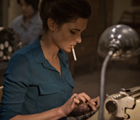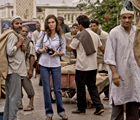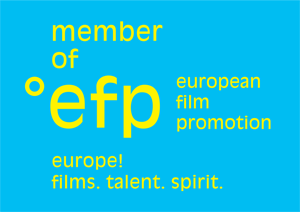Oriana... (Film) (L'Oriana)
by Marco Turco
original title:
L'Oriana
directed by:
cast:
screenplay:
cinematography:
editing:
set design:
costume design:
music:
production:
Fandango, Rai Fiction, with the support of Regione Lazio
distribution:
world sales:
country:
Italy
year:
2014
film run:
110'
format:
colour
release date:
03/02/2015
festivals & awards:
- Festival du Cinema Italien de Bastia 2016: En Compétition
- Cinéalma - L’âme de la méditerranée 2015
- ICFF Italian Contemporary Film Festival 2015: Highlights
- ST. ALi Italian Film Festival - Australia 2015: Lights, Drama, Action!
- Villerupt Italian Film Festival 2015: Panorama
A biopic about Oriana Fallaci, the Italian journalist, author, and interviewer's life. The underlying theme of the movie is about her thoughts as well as the missed opportunity to be both a front line reporter and a mother.
In one of her last trips back to Italy, Oriana decides to re-organize her journalistic and photographic materials stored for years in the old family home, in the Tuscan countryside. To do so she contacts the University of Florence, which sends an aspiring journalist called Lisa, who is full of good will but has no specific competencies and has accepted to do the work simply to get to know the person she considers an idol. A complex relationship springs between the two women, made of curiosity and esteem, of rifts and moments of solidarity, of ideological differences but also human closeness, in which Oriana's battle against death intertwines with Lisa's battle for life, as she is committed to conciliate what the other woman considers irreconcilable: the passion for front line journalism with the desire to be a woman and mother. In this confrontation between two women from such distant generations and of opposite temperament, the story develops - step by step - together with thoughts about being one of the most famous reporters in the world.
Her adventurous life started in the years of Fascism. As a little girl, she lives the days of fighting as a partisan relay. The experience of war and the intense relationship with her father, one of the leaders of Florence's resistance, ends up permanently tarnishing her way of looking at the future. Aged 16, Oriana becomes a crime news reporter, going round police stations and hospitals on her bike until late at night. On her twentieth birthday she sends an article to L'Europeo, at the time the most important magazine in Italy, and her dream comes true: the article is published on the front page and she is soon hired. Together with a great photographer, Duilio Pallottelli, Oriana travels the world to write about women. In Karachi she comes across the wedding of a child bride in her hotel. An emotional encounter, because talking to this little creature who isn't a woman yet and to other female figures that surround her will lead the journalist to discover an unknown planet, made of rituals, fear and dreams, different from those in the West. But via characters as different from her as these, Oriana also reflects about herself. Her fortune - she says - is to be have born Italian, poor and a woman: because being a woman "is an adventure that requires a lot of courage, a never ending challenge. You need to fight more, see more, think more".
The theme of war starts attracting Oriana's attention again during the years of the Vietnam War. Through the pages of L'Europeo she tells about what she sees, without taking sides with the Vietcong, with the Americans or the South Vietnamese. She discovers lies and atrocities, but also the heroism and humanity of that "folly" made of blood, pain, death. And love. The one for a journalist who stands out of the crowd like her: Francis Pelou.
In mid 1968 she leaves Vietnam and on October 2nd, during a demonstration in Mexico City, Oriana is wounded: it's an organized massacre, the police shoots at the crowd, hundreds of young people die and she is dropped off at the morgue, believed to be dead. Luckily a priest notices she is breathing.
Staring so closely into death's eye and love affairs without a happy ending do not lead Oriana to seek safer shores. In August 1973 Oriana meets Alekos Panagulis, the leader of the Greek Resistance. They meet the day he is released from prison: they fall in love and become inseparable. Alekos is like her: free, without dogma, without political party, with the same thirst for truth. These are days of love and then pain. Oriana experiences the tragedy of abortion, which she then decides to tell in a monologue that goes on to become a publishing success: Letter to a child never born. It's the only period of her existence where she divides her public life and her private life. Then all of a sudden, in just a few months, the idyll falls apart. Alekos dies in a "induced" car crash. The desperation, the pain, the tears are converged into the writing of A man: it's not journalism, it talks about her and Alekos, about pain, tears, finding each other, loosing each other. Oriana is broken inside, tired. But "there are moments in life when being silent is a crime and talking a duty". And she knows only one way, one road to avoid escaping: to start again, even in a world that for her looks more and more like hell.
Among the many interviews to the world's most powerful men, the most fantastic and incredibly adventurous is the one to Khomeini. During an exchange-confrontation, Oriana finds the courage for an unthinkable provocation: she removes the chador she has been made to wear in front of the father of the Islamic revolution. A face-on confrontation with Power. Maybe the last, because her kind journalism seems to be disappearing among the progressing new.
And so with one of the most sensational rejections of her lifetime she decides to wave goodbye to newspapers and magazines and retires to New York to write the story of her life and of her family. After many wars she is looking for peace. But she is deceiving herself. Her peace is interrupted a morning of 2001: it's September 11th, the towers come down live on TV, the world changes, it will never be the same again. And Oriana's private life is also devastated: she has just found out she has lung cancer. She calls it "The Alien": her battle becomes a fight against Evil and -at the same time - against terrorism, extremism and religious fanaticism. It's time to go public again with her frontline journalism. But it's also the right time for a reflection on how an adult Oriana, with her "laic fundamentalism", seems in contrast with the young girl from Florence curious about the world and eager for confrontation with even the most distant cultures from her own.
When the end is near, Oriana decides to abandon her American exile and to return home, to Italy. To see Florence a last time. And it's there she meets Lisa again. The girl, who is about to become a young mother, is for her the mirror of a new way of being woman and journalist. And the regrets for what might have been and was not marry with the awareness that her approach, stormy and passionate, with writing and the world, paved the way for many women who will come after her.






